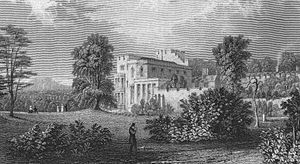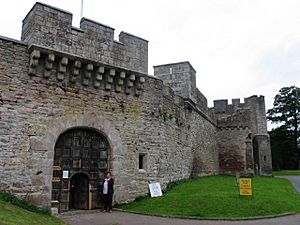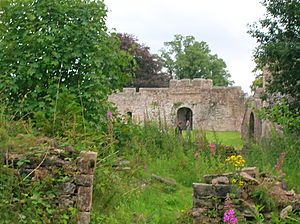Brougham Hall facts for kids
Brougham Hall is a really old and interesting house in the village of Brougham, near Penrith in Cumbria, England. Today, it's a special museum where you can learn about its long and exciting history. Imagine a place that has seen hundreds of years of changes!
Contents
The Long Story of Brougham Hall
Brougham Hall has been around for a very long time, with its story stretching back almost a thousand years. It has been owned by many different families and has seen many important events.
Early Days: From Old Families to New Owners
The land where Brougham Hall stands might have belonged to the de Burgham family even before the Norman Conquest of England. This big event happened after 1092 in this part of England, when William the Conqueror took control. The de Burghams were allowed to keep their land by serving the powerful Vieuxpont lords, who lived nearby at Brougham Castle.
Over the years, parts of the hall were sold, and it passed through the hands of several families. In 1654, a famous lady named Lady Anne Clifford, 14th Baroness de Clifford, who owned Brougham Castle, bought one part of Brougham Hall. She made many improvements, including rebuilding the hall's chapel, St. Wilfrid's, around 1659.
After Lady Anne passed away in 1676, her lawyer and manager, James Bird, bought her share of the hall. He was the first person since the de Broughams to own the entire building! Later, in 1726, the hall was sold to John Brougham. He was a very successful person from another branch of the old de Brougham family. He worked for the government's tax department, was a lawyer, and a local landowner.
What Brougham Hall Looks Like
The oldest part of Brougham Hall is its gateway, which was built way back in the 1200s. The main part of the hall, called the Tudor Hall, was built later, between 1480 and 1520. The guardhouse, which protected the hall, was built in the 1600s by James Bird.
The hall is also close to where a fierce battle happened in December 1745. This was during the Jacobite risings, when Prince Charles Edward Stuart's army fought against government forces in what was called the Clifton Moor Skirmish.
Growing Bigger and Royal Visits
In the 1800s, a very important person named Henry Brougham, 1st Baron Brougham and Vaux, became famous. Because of his success, Brougham Hall was made much bigger between 1830 and 1847. An architect named Lewis Nockalls Cottingham designed the new parts, and Henry's brother, William Brougham, 2nd Baron Brougham and Vaux, helped manage the building work.
After these changes, Brougham Hall became a popular place for important people from London and even royalty to visit. The most exciting visit was in 1905, when King Edward VII himself came to the hall!
Hard Times and a Secret War Project
After World War I, many large country houses, including Brougham Hall, faced money problems. The owner at the time, Victor Brougham, 4th Baron Brougham and Vaux, had a lot of debts and tried to earn money by gambling, but it didn't work out. Because of these money troubles, Victor sold the hall in 1934, and it was even planned to be torn down.
However, Brougham Hall had a secret role during World War II. From 1941 to 1945, it was a secret place where new tank technology was developed. This project was called Canal Defence Light (CDL). Today, there's a special plaque at the hall to remember the brave people who worked there during the war. There's also a bunker that was used during that time.
Bringing the Hall Back to Life
After World War II, the hall was left empty and started to fall apart. But in 1967, a man named Christopher Terry bought it with his wife, Alison. They were determined to stop the hall from falling apart completely.
Today, many volunteers are working hard to fix up and restore Brougham Hall. It is now open to visitors all year round, so people can explore its amazing history and see all the hard work being done to preserve it.
More to Explore
- Grade II* listed buildings in Westmorland and Furness
- Listed buildings in Brougham, Cumbria
- Brougham Castle – a nearby ruined castle
 | Frances Mary Albrier |
 | Whitney Young |
 | Muhammad Ali |




